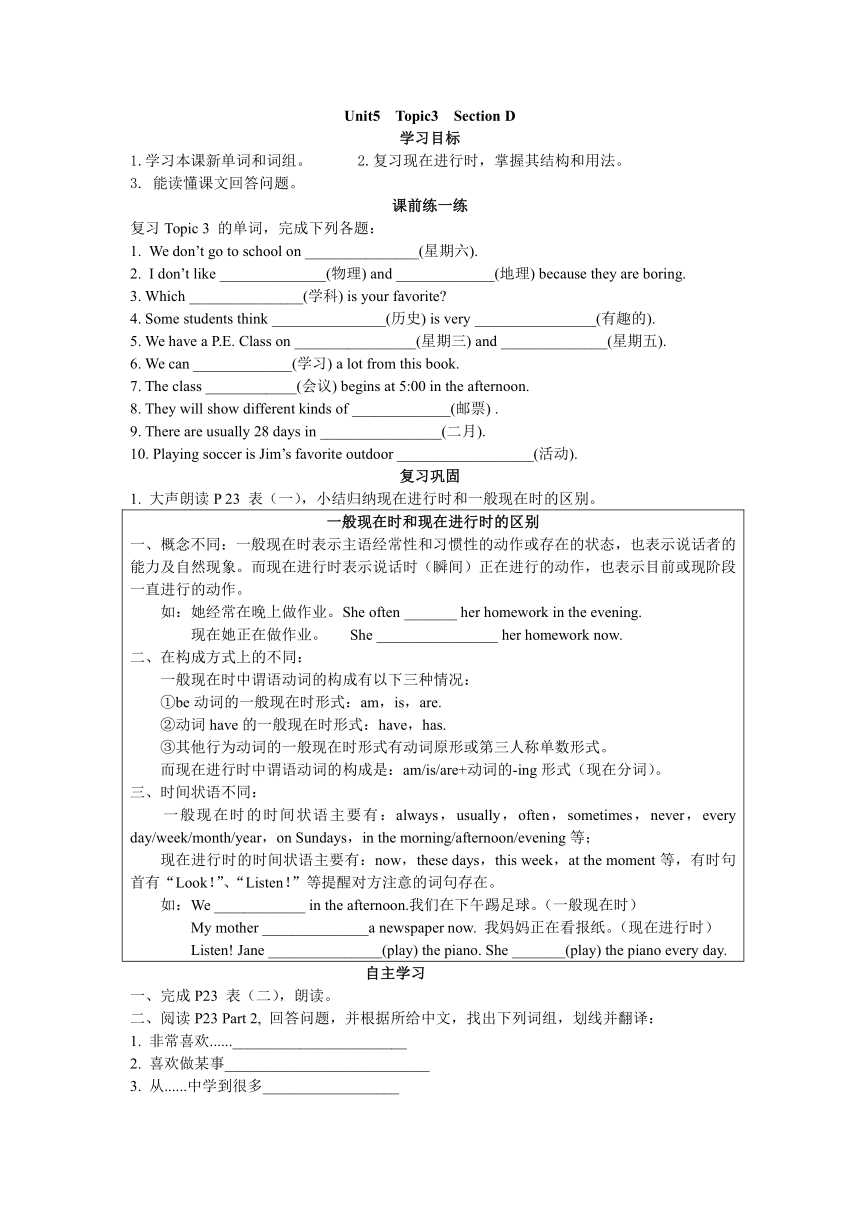Unit 5 Topic3 My school life is very interesting. SectionD 学案(无答案)
文档属性
| 名称 | Unit 5 Topic3 My school life is very interesting. SectionD 学案(无答案) |  | |
| 格式 | docx | ||
| 文件大小 | 17.9KB | ||
| 资源类型 | 教案 | ||
| 版本资源 | 仁爱科普版 | ||
| 科目 | 英语 | ||
| 更新时间 | 2021-05-31 17:12:51 | ||
图片预览

文档简介
Unit5 Topic3 Section D
学习目标
1.学习本课新单词和词组。 2.复习现在进行时,掌握其结构和用法。
3. 能读懂课文回答问题。
课前练一练
复习Topic 3 的单词,完成下列各题:
We don’t go to school on _______________(星期六).
I don’t like ______________(物理) and _____________(地理) because they are boring.
3. Which _______________(学科) is your favorite?
4. Some students think _______________(历史) is very ________________(有趣的).
5. We have a P.E. Class on ________________(星期三) and ______________(星期五).
6. We can _____________(学习) a lot from this book.
7. The class ____________(会议) begins at 5:00 in the afternoon.
8. They will show different kinds of _____________(邮票) .
9. There are usually 28 days in ________________(二月).
10. Playing soccer is Jim’s favorite outdoor __________________(活动).
复习巩固
大声朗读P 23 表(一),小结归纳现在进行时和一般现在时的区别。
一般现在时和现在进行时的区别
一、概念不同:一般现在时表示主语经常性和习惯性的动作或存在的状态,也表示说话者的能力及自然现象。而现在进行时表示说话时(瞬间)正在进行的动作,也表示目前或现阶段一直进行的动作。
如:她经常在晚上做作业。She often _______ her homework in the evening.
现在她正在做作业。 She ________________ her homework now.
二、在构成方式上的不同:
一般现在时中谓语动词的构成有以下三种情况:
①be动词的一般现在时形式:am,is,are.
②动词have的一般现在时形式:have,has.
③其他行为动词的一般现在时形式有动词原形或第三人称单数形式。
而现在进行时中谓语动词的构成是:am/is/are+动词的-ing形式(现在分词)。
三、时间状语不同:
一般现在时的时间状语主要有:always,usually,often,sometimes,never,every day/week/month/year,on Sundays,in the morning/afternoon/evening等;
现在进行时的时间状语主要有:now,these days,this week,at the moment等,有时句首有“Look!”、“Listen!”等提醒对方注意的词句存在。
如:We ____________ in the afternoon.我们在下午踢足球。(一般现在时)
My mother ______________a newspaper now. 我妈妈正在看报纸。(现在进行时)
Listen! Jane _______________(play) the piano. She _______(play) the piano every day.
自主学习
一、完成P23 表(二),朗读。
二、阅读P23 Part 2, 回答问题,并根据所给中文,找出下列词组,划线并翻译:
非常喜欢......_______________________
2. 喜欢做某事___________________________
从......中学到很多__________________
4. 谢谢你们的努力工作!_____________________
2语法点拨
I can learn a lot from it. 我能从中学到很多。
learn a lot from 意为“从......学到很多”。
知识拓展:learn sth. from sb. 向某人学习...... ; learn sth. from sth. 从......中学习;
learn from sb. 向某人学习
如:你可以向这位厨师学习烹饪。 You can __________cooking _________ the cook.
他从这本书中学到很多。He _______ _____ _______ _________ this book.
我们应该向雷锋学习。We should ___________ ____________Lei Feng.
Thank you for your hard work! 谢谢你们的努力工作!
(1)Thank you for sth. / doing sth. 意为“为......而感谢”,for 接表示感谢的原因。
如:谢谢你的帮助。 ________ _______ ______ ________ _________.
(2)hard 此处是形容词,意为“努力的,辛苦的”, hard work 意为“努力工作/ 辛勤工作”。hard 作形容词是还可以表示“困难的;硬的”。hard还可作副词,意为“努力地;猛烈地”。 如:She studies very hard. 她学习非常努力。(副词,努力地)
It is hard for him to move the stone. 对他来说,搬动这块石头很难。(形容词,困难的)
It is raining hard outside. 外面正下着大雨。 (副词,猛烈地)
学习目标
1.学习本课新单词和词组。 2.复习现在进行时,掌握其结构和用法。
3. 能读懂课文回答问题。
课前练一练
复习Topic 3 的单词,完成下列各题:
We don’t go to school on _______________(星期六).
I don’t like ______________(物理) and _____________(地理) because they are boring.
3. Which _______________(学科) is your favorite?
4. Some students think _______________(历史) is very ________________(有趣的).
5. We have a P.E. Class on ________________(星期三) and ______________(星期五).
6. We can _____________(学习) a lot from this book.
7. The class ____________(会议) begins at 5:00 in the afternoon.
8. They will show different kinds of _____________(邮票) .
9. There are usually 28 days in ________________(二月).
10. Playing soccer is Jim’s favorite outdoor __________________(活动).
复习巩固
大声朗读P 23 表(一),小结归纳现在进行时和一般现在时的区别。
一般现在时和现在进行时的区别
一、概念不同:一般现在时表示主语经常性和习惯性的动作或存在的状态,也表示说话者的能力及自然现象。而现在进行时表示说话时(瞬间)正在进行的动作,也表示目前或现阶段一直进行的动作。
如:她经常在晚上做作业。She often _______ her homework in the evening.
现在她正在做作业。 She ________________ her homework now.
二、在构成方式上的不同:
一般现在时中谓语动词的构成有以下三种情况:
①be动词的一般现在时形式:am,is,are.
②动词have的一般现在时形式:have,has.
③其他行为动词的一般现在时形式有动词原形或第三人称单数形式。
而现在进行时中谓语动词的构成是:am/is/are+动词的-ing形式(现在分词)。
三、时间状语不同:
一般现在时的时间状语主要有:always,usually,often,sometimes,never,every day/week/month/year,on Sundays,in the morning/afternoon/evening等;
现在进行时的时间状语主要有:now,these days,this week,at the moment等,有时句首有“Look!”、“Listen!”等提醒对方注意的词句存在。
如:We ____________ in the afternoon.我们在下午踢足球。(一般现在时)
My mother ______________a newspaper now. 我妈妈正在看报纸。(现在进行时)
Listen! Jane _______________(play) the piano. She _______(play) the piano every day.
自主学习
一、完成P23 表(二),朗读。
二、阅读P23 Part 2, 回答问题,并根据所给中文,找出下列词组,划线并翻译:
非常喜欢......_______________________
2. 喜欢做某事___________________________
从......中学到很多__________________
4. 谢谢你们的努力工作!_____________________
2语法点拨
I can learn a lot from it. 我能从中学到很多。
learn a lot from 意为“从......学到很多”。
知识拓展:learn sth. from sb. 向某人学习...... ; learn sth. from sth. 从......中学习;
learn from sb. 向某人学习
如:你可以向这位厨师学习烹饪。 You can __________cooking _________ the cook.
他从这本书中学到很多。He _______ _____ _______ _________ this book.
我们应该向雷锋学习。We should ___________ ____________Lei Feng.
Thank you for your hard work! 谢谢你们的努力工作!
(1)Thank you for sth. / doing sth. 意为“为......而感谢”,for 接表示感谢的原因。
如:谢谢你的帮助。 ________ _______ ______ ________ _________.
(2)hard 此处是形容词,意为“努力的,辛苦的”, hard work 意为“努力工作/ 辛勤工作”。hard 作形容词是还可以表示“困难的;硬的”。hard还可作副词,意为“努力地;猛烈地”。 如:She studies very hard. 她学习非常努力。(副词,努力地)
It is hard for him to move the stone. 对他来说,搬动这块石头很难。(形容词,困难的)
It is raining hard outside. 外面正下着大雨。 (副词,猛烈地)
同课章节目录
- Unit 5 Our school life
- Topic 1 I usually come to school by subway.
- Topic 2 A few students are running around the play
- Topic 3 My school life is very interesting.
- Unit 6 Our local area
- Topic 1 Is there a computer in your study?
- Topic 2 My home is in an apartment building.
- Topic 3 Which is the way to the hospital?
- Review of Units 5-6
- Unit 7 The Birthday
- Topic 1 When is your birthday?
- Topic 2 Can you sing an English song?
- Topic 3 Everyone had a good time.
- Unit 8 The seasons and the Weathe
- Topic 1 What's the weather like in summer?
- Topic 2 The summer holidays are coming.
- Topic 3 Let’s celebrate!
- Review of Units 7-8
- 旧版资料
- Unit 5 Our School Life
- Unit 6 Our Local Area
- Unit 7 The Birthday
- Unit 8 The seasons and the Weathe
- Unit 7 Celebrating the Birthday(老版本)
